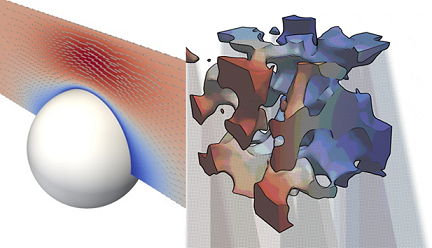How do you harvest wind energy? How do you improve the aerodynamics of a car? How do you cool a microchip? How do you make sustainable fuels? How do you extract CO2 from the air and store it? How do you print food? If these questions spark your curiosity, then the Master’s track in Engineering Fluid Mechanics at the TU/e is right up your alley.
Fluid mechanics is all around us, even though most often we cannot see it. Fluid mechanics provides understanding of how fluids behave, making it highly relevant for many engineering systems. That includes those that are essential in solving the big societal challenges we face today. EFM engineers develop sustainable energy systems and optimize industrial processes - for example in chip manufacturing and printing technology. They also design efficient ways to recycle materials.
What’s in it for me?
Engineering Fluid Mechanics is all about acquiring fundamental understanding of fluid flows and mastering the tools to use that knowledge to develop technological innovations. The fundamental underpinning of this master’s track helps you to become a fluid mechanics specialist, capable of making an impact on a broad range of fields and applications. The awareness in this master’s track for multi-disciplinarity, characteristic for a mechanical engineer, will train you to become an effective team-player in a research and development environment.
Student stories

What’s the track all about?
Heat and fluid flows, transport phenomena, computational fluid dynamics, turbulence, turbo-machinery, optimal diagnostics, rheology, porous media flows and more. Engineering Fluid Mechanics covers a coherent set of disciplinary topics. This master’s track encompasses the three pillars of science: theory, experiments, and simulations. Specialized EFM labs (such as the Darcy lab) and high-performance computing facilities are at the center of our education and research. EFM provides you with the skills and know-how to use these amenities, including training in software development and state-of-the-art simulation tools (for example, open-source codes such as Nutils and commercial CFD packages such as ANSYS Fluent).
Why would this master’s track be a good fit for me?
If you are interested in fluid flows, aerodynamics, sustainable energy systems or material processing, enroll in the Master’s track in Engineering Fluid Mechanics! To do so, however, this master’s track requires a bachelor's degree in a field related to mechanical engineering, applied physics, aerospace engineering, or similar. You should have prior knowledge in subjects such as continuum mechanics, thermo-dynamics, and transport phenomena. Affinity with physics and mathematics in general is favorable.
Why should I follow this master’s track at the TU/e?
The Netherlands has been at the forefront of fluid mechanics education and research for decades, training highly skilled engineers and researchers for high-tech industries. In Eindhoven - which is at the heart of the Brainport region of the Netherlands - the fluid mechanics expertise has found its way to sustainable energy companies, printing technology companies, the semiconductor sector, and many more. The broad adoption of fluid mechanics in the region creates a unique learning environment, focused on fundamental understanding and application in the context of state-of-the-art technologies. As an EFM graduate, you will have the knowledge and skills at your disposal to help tackle complex and urgent societal issues related to fluid mechanics. In view of the societal and industrial relevance of fluid mechanics, the demand for engineers who have graduated in EFM is high.
Related master's program and tracks
Visit us
Do you want to stay informed about important information about studying at TU/e and upcoming events? Then create an account in MyStart@TU/e!
Contact

This program is NVAO-accredited. In the Netherlands, the NVAO assesses the internal quality assurance of universities and colleges and the quality of their programs.